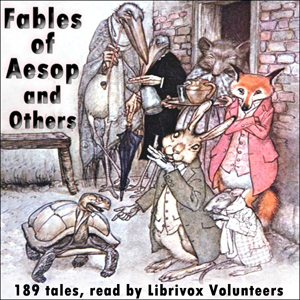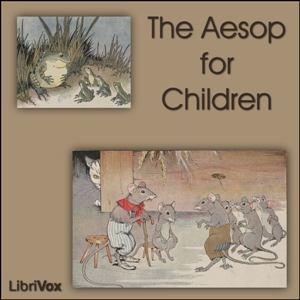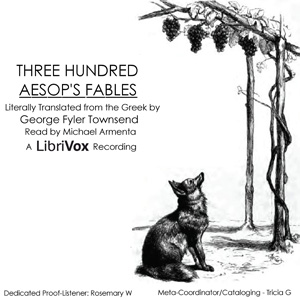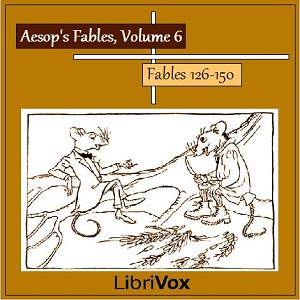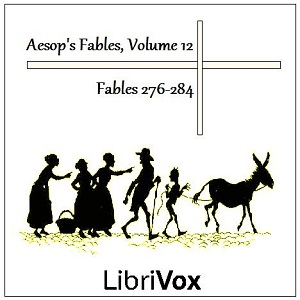Three Bright Aesop Tales - Aesop
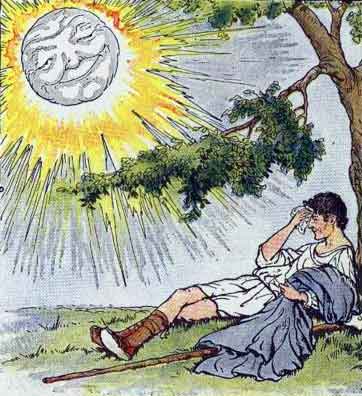
Download the audio (Right Click, Save As)

The Sun is our narrator for these three stories adapted from Aesop’s Fables. He looks down on the Earth and sees all the human folly. He tells us the tale of the Milkmaid whose head is full of dreams. Then he relates the famous story of Juno and the Peacock about a bird who wants magnificent feathers. His last story features himself and the North Wind.
As ever, these charming tales by Aesop come with morals for life.
Adaptation by Bertie.
Read by Natasha.
Proofread by Claire Deakin & Jana Elizabeth.
Pictures by Milo Winter
Duration 12.10.
In the morning I am soft and gentle. In the middle of the day, I am harsh and white. When the evening comes, I rest my red head on the mountains. Yes, as you have probably guessed by now, I am the sun.
All day long, I look down on the Earth and I see all the things that go on – all the wisdom, and the folly – but mostly the folly. As for the things that go bump in the night? I don’t see any of those – but I hear all the best gossip from my pretty lady friend, the moon.
From my vantage point, I can’t help but see a few juicy stories unfold. I will tell you three of them today, and with the help of the great storyteller, Aesop, I shall give you a moral for each of them.
My first tale is of a milkmaid. Only yesterday, I Looked down and caught sight of her – I did not fail to notice how pretty she was. I watched her going along the lane with a pail of milk on her head. I shone brightly for the lovely girl, and my rays set off her blonde hair and made her heart happy. I could see that she was chatting away to nobody but herself. I tuned in my ear and listened to what she was saying.
“This lovely creamy milk will give me plenty of butter to churn,” she said. “Yes, I will make the best butter, and I will take it to market. I will get a good price for my butter, and with the money I make, I will buy lots of eggs for hatching. How nice it will be when the yard is full of fine young chicks! Then, when May Day comes I will sell the hens, and with the money I’ll buy a lovely new dress for the fair. All the young men will look at me. They will come and try out their smooth talk on me, but I shall very quickly send them about their business!”
She smiled, as she thought of the witty one-liners that she would deliver to all the smooth-talking young men. As she imagined the scene, she tossed her head scornfully. But oh! Down fell the pail – and out spilt the milk onto the ground. The white creamy liquid trickled into the ditch, and with it, the pretty maid’s day dreams – her butter, her profit, her chickens, her eggs, her new dress, and her vain young men – all disappeared into the ground.
I looked down on all this and tried not to smile at the poor milkmaid’s misfortune. But I could not help remembering the words of a wise old lady: Don’t count your chickens before they are hatched. It’s a very valuable lesson in life.
My next story is about the peacock. He is the most royal of birds – or so he thinks. When I shine down with my bright rays, he loves to open up his feathers to show off all his wonderful colours. How he gleams with emerald gold, purple, and azure! Why, he is shining so, that he considers himself a worthy rival to me! But he was not always so bright and beautiful. Once, long ago, he was just an ordinary, dusty sort of farmyard bird. This bothered him – for in his heart, he longed for greatness. His life abruptly changed when, one day, as he was pecking grass by the lake, he met the goddess Juno. He knew that his chance for transformation had come.
“Divine Juno, lovely goddess,” he said. “Why are my feathers so plain and ordinary? I want to be beautiful. I long for everyone to admire me. In fact, I want to be the most indisputably magnificent bird in the world. You are a goddess. You can do this for me in an instant. If you work your will, even the emperor will admire and envy me. I pray, dear goddess – make me magnificent.”
Juno looked at the dull and ordinary bird and thought: “How vain and pretentious he is! I will give him what he wants, but I will teach him a lesson.”
When the peacock next saw his reflection in the water, he realised that she had granted his wish – for he was beautiful beyond his dreams. His feathered tail was more magnificent than the tapestry that hung behind the emperor’s throne. The other birds gathered round to admire him – and how he strutted up and down like a King! He patronised all the scruffy farmyard birds – the hens, the geese, the ducks, and other such riff-raff!
The other birds were not gazing at him, as he thought they should. They were looking up into the sky. He too looked up, and he saw how the powerful, and kingly eagle span out his wings, and soared high into the heavens – so high that he flew up to wish me a good morning through the clouds.
Who could doubt that the eagle was the most royal of all the birds? Not the ducks and the geese who squawked in homage to the soaring King.
“Pah!” Said the peacock, “I will fly even higher.” He lifted his wings – but they were heavy and weighed down with decorative feathers. Yes, he looked wonderful, but the sly goddess had made him pay a price for his beauty – he could not longer fly.
“Hmmm,” I thought, as I looked down. “That peacock is all show.” There’s an important lesson here. It’s not only feathers that make fine birds. Oh yes, there is a good moral in this tale: Don’t harm your strength and your health for the sake of beauty.
My last story features a truly radiant character. This, if you will permit me, is a story about myself. I have a rather gusty friend called the North Wind. I was watching in amusement one day how he tormented a man who was walking along the road. He was trying to blow the man’s hat off, and how he huffed and puffed with all his might. But the man was wise to him, and he held his hat firmly down on his head.
I laughed: “Ho-ho North Wind. That man’s got one up on you.”
“Well I bet you can’t do any better,” hissed the North Wind testily.
“I bet I can,” I said – and I shone down with my warmest, most health-giving rays. The man felt gladness as he walked along. He smiled and then he took his hat off to cool his head.
“There you see,” I said. “Gentle and kind persuasion win where force and blusters fail.”
Audible

